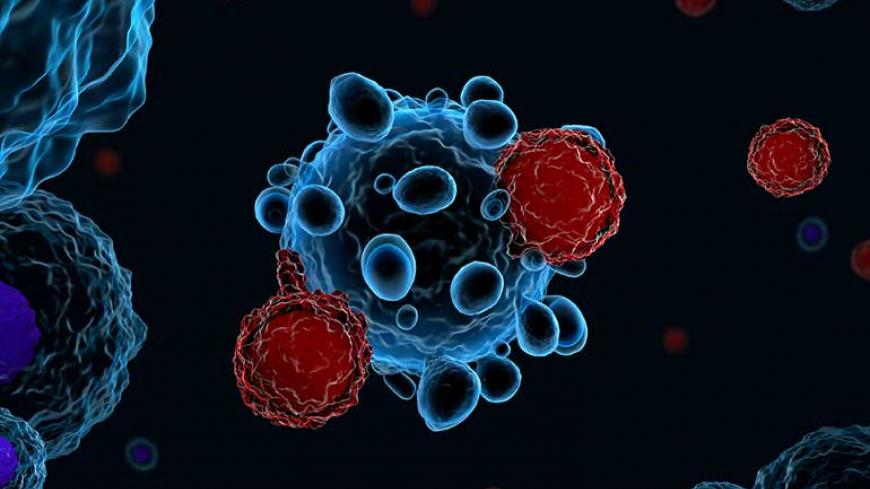UCLA Scientists create a renewable source of cancer-fighting T cells from pluripotent stem cells
University of California - Los Angeles Health Sciences Jan 18, 2019 6 years, 3 months, 1 week, 1 day, 18 hours, 53 minutes ago
UCLA researchers have developed the first technique for turning certain stem cells into mature T cells capable of fighting cancer.
The university announced on January 17
th 2019, that its scientists had developed a technique for coaxing pluripotent stem cells – which can create cell in the body and be grown in a lab – into T cells that can attack tumors.
Immune system T cells attacking cancer cells (CAR T cell therapy)
The technique, published in the journal Cell Stem Cell, employs artificial thymic organoids that can mimic the thymus, the organ in which T cells develop from blood stem cells.
T cells are cells of the immune system that fight infections, but also have the potential to
eliminate cancer cells. The ability to create them from self-renewing pluripotent stem cells using the UCLA technique could lead to new approaches to cancer immunotherapy and could spur further research on T cell therapies for viral infections
such as HIV, and autoimmune diseases. Among the technique's most promising aspects is that it can be combined with gene editing approaches to create a virtually unlimited supply of T cells able to be used across large numbers of patients, without the need to use a patient's own T cells.
A treatment known as CAR-T therapy removes T cells from the body, engineers them to fight cancer and infuses them back into a patient.
The new technique developed by UCLA could produce such cells without collecting them from individual patients, potentially creating universal T cells that may lead to cheaper and more accessible treatments for cancer and other immune diseases.
“What’s exciting is the fact that we start with pluripotent stem cells,” said Dr. Gay Crooks, a professor of pathology and laboratory medicine and pediatrics, and the co-director of the Eli and Edythe Broad Center of Regenerative Medicine and Stem Cell Research at UCLA, in a statement.
“My hope for the future of this technique is that we can combine it with the use of gene editing tools to create ‘off the shelf’ T cell therapies that are more readily available for patients.”
Other researchers have been only partially successful in their attempts to generate T cells using methods that involve combining pluripotent stem cells with a layer of supporting cells. But the T cells produced in those previous studies did not mature to become fully functional T cells.
Crooks and her team previously demonstrated that the 3D structure of an artificial thymic organoid allowed mature T cells to develop from adult blood stem cells, and hypothesized that they would also support mature T cell production from pluripotent stem cells.
"The 3D structure of the artificial thymic organoid seems to provide the right supportive signals and environment needed for mature T cells to properly develop," she said.
<
;br />
The research demonstrated that the artificial thymic organoids can efficiently make mature T cells from both kinds of pluripotent stem cells currently used in research: embryonic stem cells, which originate from donated embryos, and induced pluripotent stem cells, which are created by reprogramming adult skin or blood cells back to an embryonic-like state.
The researchers also showed they could genetically engineer pluripotent stem cells to express a cancer-targeting T cell receptor and, using artificial thymic organoids, generate T cells capable of targeting and killing tumor cells in mice.
"Once we create genetically edited pluripotent stem cell lines that can produce tumor-specific T cells in artificial thymic organoids, we can expand those stem cell lines indefinitely," said Amélie Montel-Hagen, the study's first co-author and an associate project scientist in Crooks' lab. Having an unlimited supply of T cells capable of fighting various types of tumors would be a major turning point for cancer treatment.
One of the remaining challenges for the UCLA scientists is that the T cells created using the artificial thymic organoids have additional molecules on their surface that are not matched to each individual patient. Those extra molecules could cause a patient's body to reject the transplanted cells, Montel-Hagen said.
"Our next step will be to create T cells that have the receptors to fight cancer but do not have the molecules that cause the rejection of the cells, which would be a major step toward the development of universal T cell therapies," said Dr. Christopher Seet, the study's first co-author and a clinical instructor in the division of hematology-oncology at UCLA.
Kite, a Gilead Co., obtained the commercial license to the artificial thymic organoid building block for cancer therapy from UCLA for an undisclosed sum.
The Santa Monica-based biotechnology firm, which developed the Yescarta CAR-T immunotherapy for non-Hodgkin's lymphoma, was sold to Gilead Sciences in August 2017 for nearly $12 billion.
Reference: Amélie Montel-Hagen, Christopher S. Seet, Suwen Li, Brent Chick, Yuhua Zhu, Patrick Chang, Steven Tsai, Victoria Sun, Shawn Lopez, Ho-Chung Chen, Chongbin He, Chee Jia Chin, David Casero, Gay M. Crooks. Organoid-Induced Differentiation of Conventional T Cells from Human Pluripotent Stem Cells. Cell Stem Cell, 2019; DOI: 10.1016/j.stem.2018.12.011
